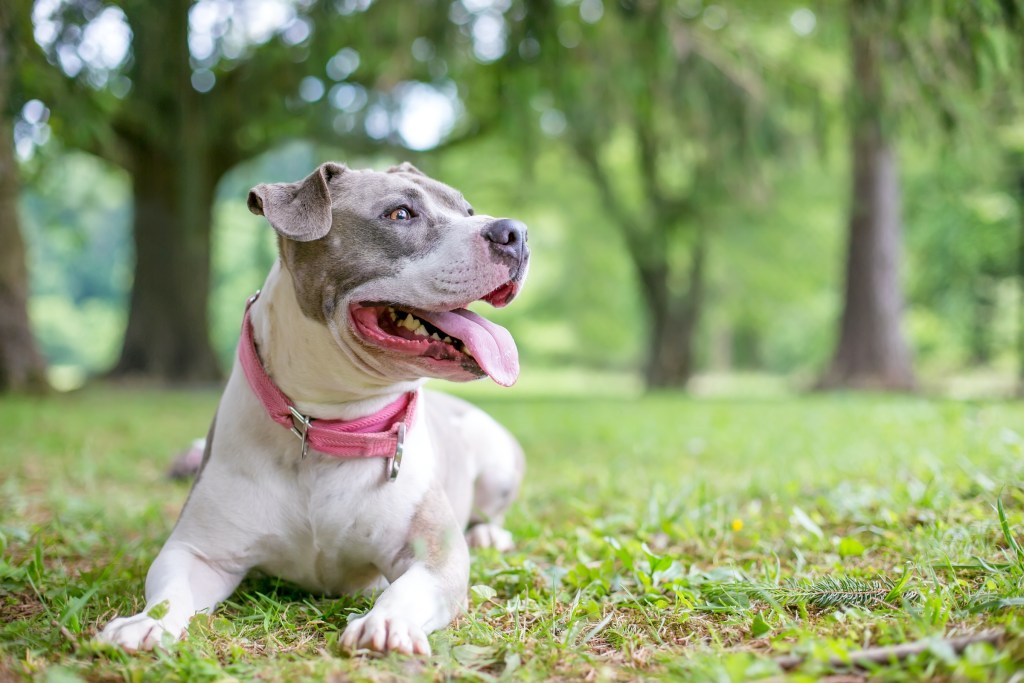Dogs can show their love in so many ways—from cuddles and playtime to protection. Some breeds are more likely than others to behave in certain ways, though, so a little research can go a long way toward letting you know what to expect.
If you’re looking for a guard dog to join your family, the breeds on this list can be a great place to start. It will take a lot of work for any of them to become a good canine citizen, however. Especially if you want a guard dog as well as a companion, don’t expect to skip out on obedience training for your furry friend. Teaching your buddy to guard and alert is no small task, so you’ll need to enlist the help of a professional dog trainer.
Once you’re ready to commit to putting in the work of preparing a pup to be a guard dog, check out these amazingly brave and loyal breeds—which experts say are perfect candidates.
Giant Schnauzer
With the same mustachioed face of their Standard and Miniature cousins, the Giant Schnauzer is equally family-friendly and eager to protect. The American Kennel Club (AKC) finds this breed extremely affectionate with loved ones—even children—though only moderately open to strangers. Combine these qualities with their highly alert, energetic personality, and you have the makings of a great guard dog.
Because these pups are also highly motivated, training could come easily to them. Destruction and boredom could also come easily, though, so make sure your buddy has ample space to run around and plenty of tasks to complete.
Staffordshire Bull Terrier
These dogs aren’t the tallest on the list, but they are sturdy and muscular. Unfortunately, Staffies are often feared and discriminated against because of their history as fighting dogs. In fact, they’re highly affectionate, friendly with kids, and very adaptable, according to the AKC. The AKC also characterizes Staffies as vigilant and eager to work, which could make them excellent guard dogs with the proper training.

German Shepherd
If you’re ready for lots of personality and frequent shedding, the German Shepherd might be your dog. There’s a reason you often see these pups as film heroes or police companions—they love to work and are fiercely loyal. According to Georgia Veterinary Associates, German Shepherd are incredibly sensitive to social situations. They learn quickly who is a friend and who may be threatening, and they have no fear when it comes time to protect their home or family.
Belgian Malinois
This breed is often mistaken for a German Shepherd, and it’s easy to see why—the similarities are striking! Also, like their German cousins, these dogs can be adaptable and friendly in almost any situation, but they can be territorial too.
Their loyalty and work drive make the Belgian Malinois a wonderful guard dog, as does their tendency for mouthiness. These pups aren’t called “Malingators” for just any old reason!
Hovawart
You didn’t think you’d get through this list without learning about a lesser-known breed, did you? The Hovawart may not be the most popular breed out there, but they do important work: search-and-rescue services. Their strong sense of smell and need for mental stimulation make this possible. Their tendency to bond closely with their families makes them a good choice for a guard or watchdog too.
Even as companion animals, these dogs need plenty of activity and exercise. “A Hovawart likes to have a job to do,” notes the AKC, “or he will use his creative nature to find one.”

The Mastiff breeds
Whether you decide on an English Mastiff, Tibetan Mastiff, or any other Mastiff breed, you can be sure you’re getting a dog who will scare off intruders. One of the key traits of these pups is their massive size—Zorba the English Mastiff holds the Guinness World Record for the longest (and heaviest) dog ever recorded. While this guy weighed over 300 pounds, it’s much more common for Mastiffs to weigh between 120 and 230 pounds.
Cane Corso
These larger-than-life muscle machines are both affectionate and ultra-tough, which can be challenging when it comes to training and socialization. These dogs aren’t recommended for first-time owners because of their stubborn nature and strong body, but with an equally assertive owner, Corsi (yes, that’s the plural form of Corso) can be fine guard dogs. They have several lines of defense at the ready, notes the AKC, starting with their intimidating appearance.
Whichever breed you’re considering for a guard dog, it makes a world of difference when you do your research before deciding on one. Research prepares you, your family, and your home for the arrival of your new friend. Don’t overlook it!



